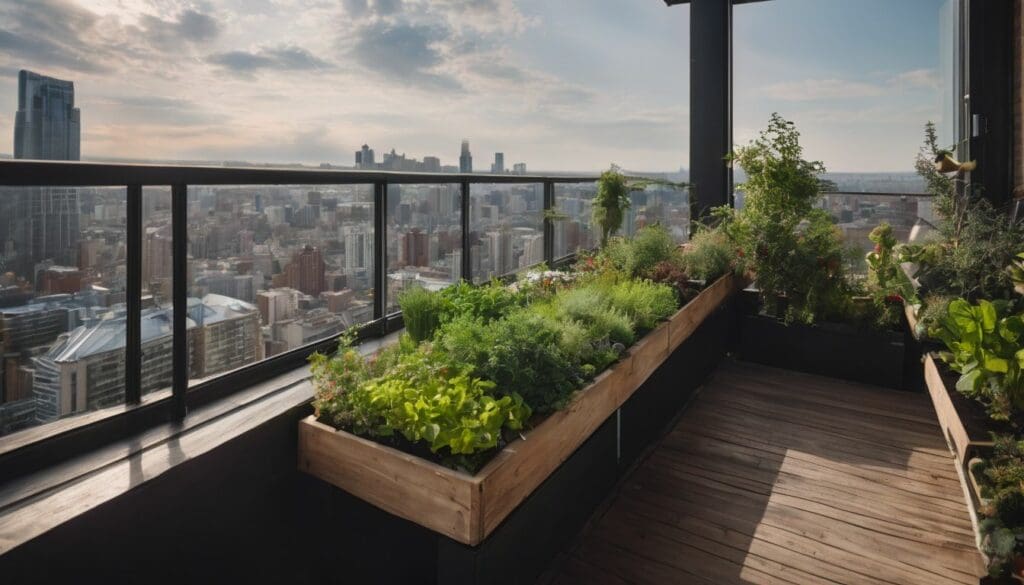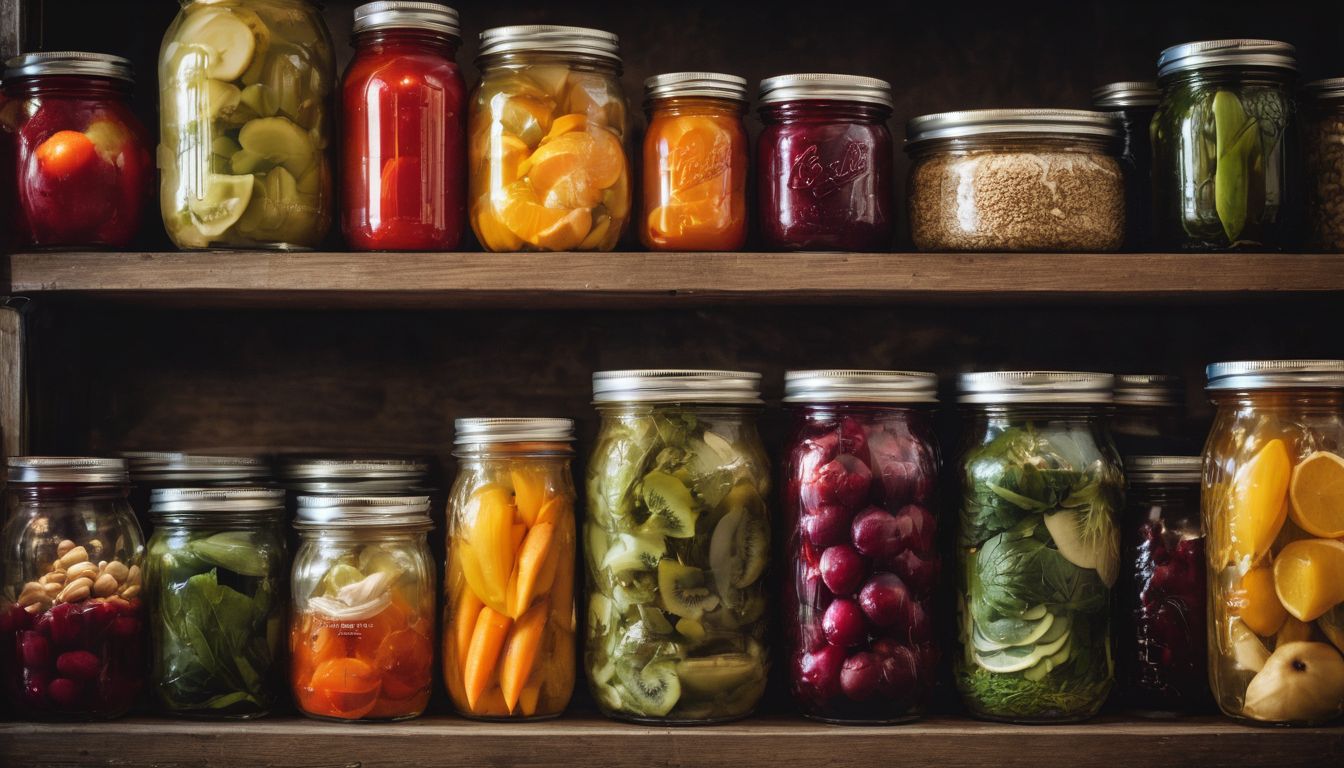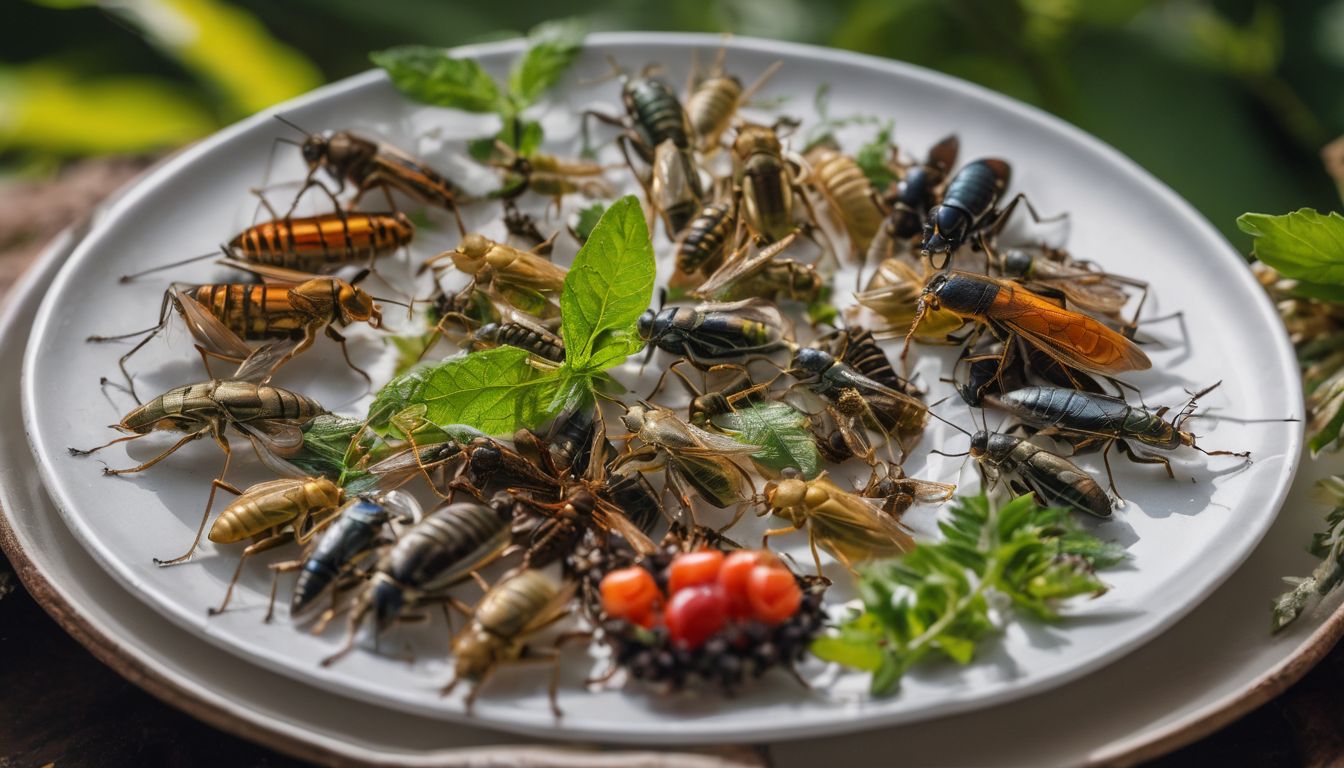Struggling to make use of your apartment’s tight outdoor space? A balcony herb garden is the perfect solution for fresh flavours at your fingertips. Our guide provides easy-to-follow steps and tips to transform even the smallest of balconies into a thriving green oasis.
Let’s get our hands dirty!
Key Takeaways
- Starting a balcony herb garden is simple and enhances biodiversity in urban settings; all you need are containers, good soil, and some seeds or seedlings.
- Select both annuals like basil and cilantro for quick harvests and perennials like rosemary and thyme for sustained growth over multiple seasons.
- Design your garden with vertical space in mind to maximise area using railing planters, hanging pots, and ensure proper sunlight by positioning plants accordingly.
- Regular care including adequate watering but avoiding waterlogging, fertilising with organic options, pruning dead leaves to encourage growth, and harvesting herbs will keep the garden healthy.
- Tackle common issues such as pests using natural methods like beneficial insects or neem oil spray while shielding plants from strong winds with barriers or windbreaks.
What is a Balcony Herb Garden?
A balcony herb garden transforms your outdoor space into a lush green haven where culinary flavors and fragrant leaves thrive. Picture pots of basil, mint, rosemary, and thyme basking in the sunshine on your very own apartment terrace.
This miniature oasis doesn’t just provide fresh herbs at your fingertips; it also helps pollinators like bees and butterflies find a place to rest in urban areas.
Incorporating such gardens into city living supports biodiversity by creating small ecosystems right outside our homes. Gardening enthusiasts use containers that fit snugly into limited spaces while turning their balconies into productive patches.
You don’t need extensive knowledge or tools to start – simple planters, good soil, seeds or seedlings, and a little daily care can kick off your personal urban herb garden.
Choosing the Right Herbs for Your Balcony Herb Garden
When selecting herbs for your balcony garden, consider both annual and perennial options to ensure a continuous harvest. Annual herbs like basil and cilantro are great for beginners, while perennial herbs like rosemary and thyme provide long-term growth.
Annual herbs
Annual herbs are plants that complete their life cycle within one growing season. They are a great choice for balcony herb gardens because they provide a quick harvest and continuous supply of fresh flavours. Here are some annual herbs to consider for your balcony garden:
- Basil: Known for its aromatic leaves, basil is a versatile herb used in various cuisines, from Italian to Thai.
- Coriander: Also known as coriander, this herb adds a zesty punch to dishes and is a staple in Mexican and Asian cooking.
- Dill: With feathery leaves and a unique flavour, dill is perfect for adding freshness to salads, dips, and seafood dishes.
- Chives: These slender green shoots have a mild onion flavour and are excellent for garnishing soups, baked potatoes, and omelettes.
- Marigold (Calendula): Although primarily grown for its vibrant flowers, marigold petals can be used to add a pop of colour and subtle tangy flavour to salads and rice dishes.
Perennial herbs
After choosing the right annual herbs for your balcony herb garden, consider adding perennial herbs for a sustainable and long-lasting garden. Here are some perennial herbs to consider:
- Lavender: Known for its calming aroma, lavender is a beautiful addition to any balcony herb garden.
- Mint: This versatile herb comes in various flavors, such as peppermint and spearmint, and can thrive in pots on your balcony.
- Thyme: A hardy herb that can withstand harsh weather conditions, making it perfect for balcony gardening.
- Rosemary: With its woody stems and fragrant leaves, rosemary is an excellent choice for a small space herb garden.
- Sage: This herb not only adds flavor to dishes but also boasts beautiful foliage that enhances the aesthetic of your balcony garden.
- Chives: Easy to grow and requiring minimal maintenance, chives are a great addition to your container herb garden.
Tips for Starting Your Balcony Herb Garden
When starting your balcony herb garden, consider whether to buy seedlings or start from seeds. Explore different balcony herb garden design ideas and how to pot your herbs effectively for a thriving urban garden.
Buying seedlings vs starting from seeds
When starting a balcony herb garden, you have the option to buy seedlings or start from seeds. Consider the following factors when making your choice:
- Cost: Seedlings are usually more expensive than seeds but can save time and effort.
- Variety: Starting from seeds allows for a wider selection of herbs compared to buying seedlings.
- Control: Growing from seeds gives you more control over the entire growing process, from germination to maturity.
- Condition: Seedlings are usually more fragile and require careful handling compared to hardier seeds.
- Availability: Some herbs may be easier to find as seedlings, while others may only be available in seed form.
Balcony herb garden design ideas
When designing a balcony herb garden, consider using vertical space to maximise planting opportunities. Hanging planters and wall-mounted containers can be used to grow herbs such as basil, thyme, and parsley.
Utilise railing planter boxes or window boxes for additional growing space without taking up valuable floor area. Incorporating a variety of container sizes and shapes adds visual interest while accommodating different types of herbs.
To create an aesthetically pleasing balcony herb garden, mix and match pots in various colours and materials, such as terracotta, ceramic, or metal. Ensure the containers have drainage holes at the bottom to prevent waterlogging.
Coordinate with your surroundings by choosing plants that complement your balcony’s aesthetic or colour scheme. Adding small decorative elements like fairy lights or wind chimes can enhance the ambiance of your outdoor sanctuary.
How to pot your herbs
To pot your herbs, follow these steps:
- Choose appropriate containers – Select pots with good drainage to avoid waterlogging, use terracotta or plastic pots for better moisture retention.
- Fill the pots with soil – Use high-quality potting mix with added organic matter and perlite for drainage.
- Plant the herbs – Carefully transfer herb seedlings or small plants into the pots, ensuring they are centrally placed and at the same depth as in their original container.
- Water thoroughly – After planting, water the herbs until excess water drains from the bottom of the pot.
- Provide proper sunlight – Place the potted herbs in a location that receives at least 6-8 hours of sunlight daily, ensuring they have enough space to thrive.
Taking Care of Your Balcony Herb Garden
Ensure your herbs receive adequate sunlight, use the right potting soil, water regularly, fertilise as needed, and prune and harvest your herbs to maintain a healthy balcony herb garden.
Read on for more expert tips on keeping your balcony herb garden thriving.
Light requirements
When choosing a spot for your balcony herb garden, consider the light requirements of the herbs you plan to grow. Most herbs need at least 6 hours of sunlight per day to thrive. Place sun-loving herbs like basil, rosemary, and sage in the sunniest spots on your balcony.
If your balcony doesn’t receive adequate sunlight, consider installing a grow light to supplement natural light and ensure healthy growth of your herbs.
For herbs that require partial shade such as mint and parsley, find a location on your balcony where they can receive morning or late afternoon sun but are shaded during the hottest part of the day.
Proper potting and soil
To ensure the health and growth of your balcony herb garden, proper potting and soil are essential.
- Use a lightweight potting mix that drains well.
- Consider organic or natural fertilisers for sustainable cultivation.
- Choose containers made of eco – friendly materials like terracotta or recycled plastic.
- Opt for larger pots to provide ample space for root growth.
- Rotate your herbs to prevent soil depletion and maintain fertility.
- Mulch the soil to retain moisture and suppress weed growth without harmful chemicals.
- Consider using self – watering containers to conserve water and maintain consistent moisture levels.
- Regularly inspect your herbs for signs of soil compaction or nutrient deficiencies, ensuring their optimal health and vitality.
Watering
To keep your balcony herb garden thriving, water your herbs regularly. Be mindful of the soil moisture levels, especially in warmer weather, to ensure that it doesn’t dry out completely.
Watering frequency may vary depending on the type of herb and its specific water requirements. Consider investing in a watering can with a narrow spout to deliver water directly to the soil around the plants.
To maintain healthy roots, apply water at the base of each plant rather than overhead. Avoid overwatering as it can lead to root rot; instead, opt for thorough but infrequent watering sessions.
Fertilising
When fertilising your balcony herb garden, use organic fertilisers to promote healthy growth. You can make compost tea by soaking compost in water, then use it to nourish your herbs with essential nutrients.
Alternatively, seek out natural liquid or granular organic fertilisers specifically formulated for herbs.
Applying the right type and amount of fertiliser will help ensure your balcony herb garden thrives and produces flavoursome, aromatic herbs throughout the year.
Pruning and harvesting
To maintain your balcony herb garden, you should regularly prune and harvest the herbs. This helps them grow healthier and more vigorously.
- Pruning: Use clean, sharp scissors to trim off any dead or yellowing leaves from the plants. This encourages new growth and prevents disease spread.
- Harvesting: When your herbs have reached full maturity, pick leaves or stems as needed. Do not pick more than one-third of the plant at once to allow for continuous growth.
- Drying herbs: Hang harvested herbs in small bundles upside down in a dark, well-ventilated area until they are completely dry.
- Storing: Once dried, store the herbs in airtight containers away from direct sunlight to preserve their flavour and potency.
- Regrowth: Regular harvesting encourages regrowth, ensuring a steady supply of fresh herbs for your culinary needs.
Troubleshooting Common Issues
Dealing with pests and protecting your balcony herb garden from strong winds can be common challenges, but there are simple solutions to tackle these issues. Read on to learn more about how to maintain a thriving balcony herb garden.
Dealing with pests
Pests can quickly ruin an herb garden: they feed on leaves and drain plants of essential nutrients. Here are some eco-friendly methods to keep pests at bay in your balcony herb garden:
- Introduce beneficial insects: Ladybugs, lacewings, and parasitic wasps are natural predators that feast on aphids, mites, and other harmful pests.
- Homemade organic sprays: Create a potent mix using ingredients like neem oil, garlic, and soap to deter pests without harming the environment.
- Companion planting: Certain herbs like basil and mint act as natural repellents for pests when planted alongside other herbs, promoting a balanced ecosystem.
- Regular inspection: Keep an eye out for early signs of pest infestations such as yellowing leaves or tiny holes, tackling issues before they spiral out of control.
- Neem oil solution: Neem oil is effective against a wide range of pests while being gentle on beneficial insects—simply dilute with water and regularly spray your herbs.
- Physical barriers: Use row covers or organic netting to shield your herbs from common pests such as caterpillars and birds without resorting to harmful chemicals.
Protecting from wind
To shield your balcony herb garden from strong winds, consider creating a barrier using tall plants or installing a windbreak. Positioning potted herbs close together can also provide mutual support and minimise the impact of gusts.
In addition, placing heavy objects around the pots can help prevent them from toppling over in windy conditions, as well as selecting sturdy containers for your herbs to grow in, such as ceramic or stone pots.
Balcony herb gardens are susceptible to damage from high winds due to their exposed location. Implementing these protective measures will ensure that your herbs remain secure and continue to thrive despite blustery weather conditions.
Solutions for Winter
Protect herbs during winter by moving potted plants indoors. Choose a sunny spot or use grow lights. Shield from cold drafts and freezing temperatures to prevent damage. Water sparingly as indoor air tends to be drier in winter, and reduce fertiliser application.
Consider creating a mini greenhouse using plastic bags or covers for outdoor herb gardens, ensuring enough airflow.
Ensure proper drainage to avoid waterlogged soil that can harm the roots of your herbs. Mulch around outdoor plants to insulate against temperature fluctuations. Suspend watering schedule but check soil moisture periodically – it should remain slightly damp but not saturated.
Keep an eye out for pest infestations that may occur due to the warmth of indoor spaces, taking necessary measures promptly.
Conclusion
In conclusion, starting a balcony herb garden is an excellent way to grow your own fresh herbs in a small space. With the right herbs, pots, and care, anyone can create a thriving herb garden on their balcony.
By following these tips and techniques, you can enjoy the benefits of homegrown herbs while supporting conservation efforts. So go ahead and get started on your DIY apartment herb garden today!
FAQs
1. What do I need to start my own balcony herb garden in a flat?
To start your balcony herb garden, grab some containers or herb pots, choose herbs you’d like to grow, and make sure you have a sunny spot on your flat’s balcony.
2. Can I create a DIY herb garden if I don’t have much space?
Absolutely! Small space gardening techniques such as container gardening are perfect for crafting a DIY herb garden right on your urban balcony.
3. How should I plant herbs to ensure they thrive in my small outdoor area?
Planting herbs that suit container life is key; use well-draining soil, give them enough sunlight and water regularly following recommended herb growing tips.
4. Is it possible to practise organic gardening when growing herbs in my flat?
Yes, even in an urban setting you can engage in organic gardening by avoiding synthetic fertilisers and pesticides while cultivating your balcony herb plants.
5. What are the best tips for maintaining a successful small-space herb garden?
Ensure proper sunlight exposure, consistent watering without overdoing it, regular pruning of the herbs to encourage growth, and research specific care requirements for each type of herb you’re growing.





